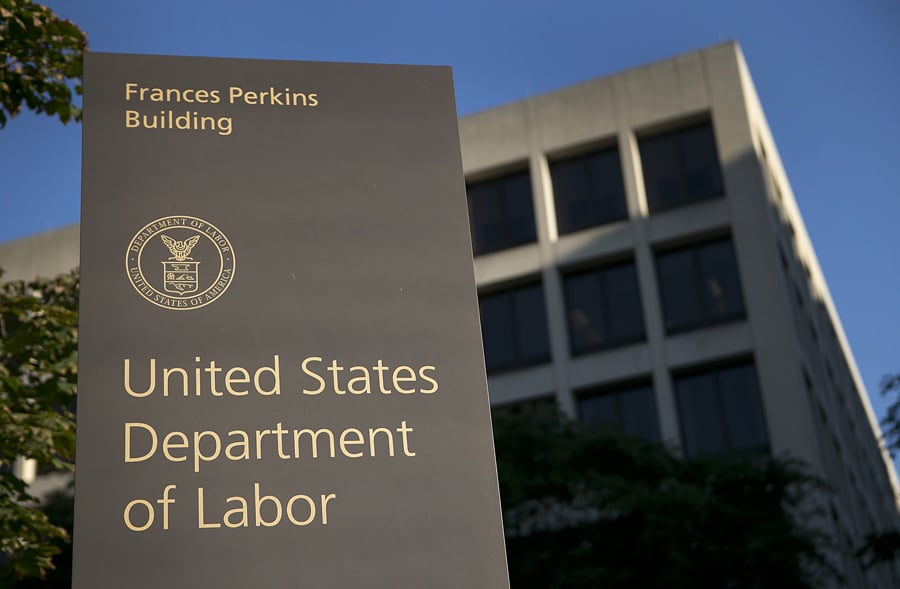

The Department of Labor is surveying some retirement plans to determine how they use environmental, social and governance factors in making investment decisions.
The New York regional office of the Employee Benefits Security Administration has sent letters to some plans that have ESG-themed funds on their investment menus.
"The Department seeks to better understand the plan fiduciaries' selection of ESG funds for inclusion in the plan's investment options and compliance with their duty to administer the plan prudently and solely for the purpose of providing benefits to participants and beneficiaries, and defraying reasonable expenses of administering the plan,” a May 22 letter from EBSA said.
The National Association of Plan Advisors first reported the letters, based on one received by the Plan Sponsor Council of America.
A DOL spokesperson confirmed the agency is examining the use of ESG in retirement plans governed by the Employee Retirement Income Security Act, such as 401(k) programs.
The focus of the inquiries is to ensure that plan fiduciaries are not sacrificing investment returns or increasing investment risks in order to meet ESG goals that aren’t related to the financial interests of plan participants, the DOL spokesperson said.
The DOL has launched the information search while a proposed rule, “Financial Factors in Selecting Plan Investments,” awaits approval by the Office of Management and Budget. Many observers anticipate that the rule will focus in part on ESG investments.
“Our speculation is that they’re collecting this information to inform a rulemaking about how fiduciaries should consider ESG-themed investments,” said Brad Campbell, a former DOL assistant secretary and head of EBSA. “It may also include fiduciary issues related to proxy voting.”
The DOL spokesperson declined to comment on the rule proposal, which was submitted to the OMB on May 29. It may undergo review for several weeks. Once the measure is approved by OMB, it will be published and open for public comment.
The most recent DOL directive on ESG came in a 2018 field assistance bulletin. Other administrations also have offered guidance on this topic.
“They’re elevating what has been dueling guidance to a new regulatory requirement,” said Campbell, a partner at Faegre Drinker Biddle & Reath.
As socially responsible investing becomes increasingly popular, it is drawing more attention from regulators.
The SEC is probing the “accuracy and adequacy of disclosures” by registered investment advisers offering their clients ESG investment strategies, the agency said in its 2020 examination priorities. The SEC’s Investor Advisory Committee recently passed a recommendation that the agency take the global lead in mandating ESG disclosure.
Allison Wielobob, general counsel at the American Retirement Association, said more regulatory direction on ESG would be helpful.
“There’s a lack of clarity,” Wielobob said. “This is an area all of us in the industry can learn more about. Service providers are starting to pay more attention to it.”
The adoption of ESG in retirement plans could follow the trajectory of target-date funds, which have become ubiquitous, she said. “Slowly they crawled into the vernacular and now, years later, every plan has them.”
This is a good time for the DOL to assess ESG because the market volatility caused by the coronavirus pandemic has demonstrated the value of socially responsible investing, said Jennifer Coombs, associate professor at the College for Financial Planning. For instance, portfolios based on ESG are less likely to be roiled by gyrating oil prices.
“It’s a smoother ride with ESG portfolios,” Coombs said. “It’s been proven it works and is useful.”
She doesn’t anticipate that the DOL will try to crimp ESG investing.
“It might be looked at with a fine-tooth comb, but I don’t think they’re going to stop the progression of the use of ESG,” Coombs said.
It could be months before a final ESG rule is promulgated. The longer the DOL takes, the more likely it is that the next presidential administration can overturn it if President Donald Trump loses the election.
“They’re really up against the clock on finalizing regulations,” Campbell said.

Relationships are key to our business but advisors are often slow to engage in specific activities designed to foster them.

Whichever path you go down, act now while you're still in control.

Pro-bitcoin professionals, however, say the cryptocurrency has ushered in change.

“LPL has evolved significantly over the last decade and still wants to scale up,” says one industry executive.

Survey findings from the Nationwide Retirement Institute offers pearls of planning wisdom from 60- to 65-year-olds, as well as insights into concerns.
Streamline your outreach with Aidentified's AI-driven solutions
This season’s market volatility: Positioning for rate relief, income growth and the AI rebound
